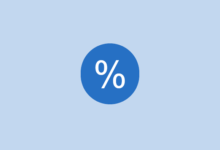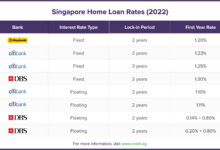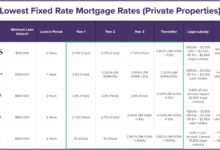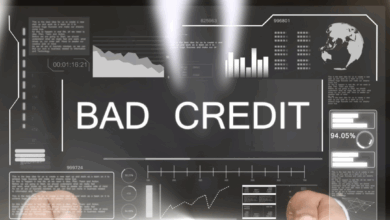Average Home Equity Loan Rates: Understanding, Comparing, And Securing
Exploring the realm of average home equity loan rates, this introduction sets the stage for a comprehensive and enlightening discussion on this crucial financial topic. From dissecting the intricacies of rates to providing insights on comparison and securing the best deals, this piece aims to equip readers with the knowledge needed to make informed decisions.
As we delve deeper into the nuances of home equity loans, we uncover the factors influencing rates, the various types of loans available, and the risks involved. By the end of this exploration, readers will have a firm grasp on how to navigate the complex landscape of home equity loan rates effectively.
Overview of Home Equity Loans
Home equity loans are a type of loan that allows homeowners to borrow against the equity in their homes. Equity is the difference between the market value of the home and the amount still owed on the mortgage. These loans are typically used for major expenses, such as home renovations, debt consolidation, or other large purchases.
How Home Equity Loans Work
When you take out a home equity loan, you receive a lump sum of money that you repay over a set period of time, usually with a fixed interest rate. The loan is secured by your home, which means that if you fail to make payments, the lender can foreclose on your property.
Comparison to Other Types of Loans
- Home equity loans typically have lower interest rates compared to personal loans or credit cards because they are secured by the home.
- Unlike a home equity loan, a home equity line of credit (HELOC) allows you to borrow against the equity in your home as needed, similar to a credit card.
Examples of How Home Equity Loans Can Be Used
- Home renovations or repairs
- Debt consolidation
- Education expenses
Potential Risks Associated with Home Equity Loans
- If you are unable to make payments, you risk losing your home through foreclosure.
- Interest rates may be variable, leading to uncertainty in monthly payments.
Applying for a Home Equity Loan
To apply for a home equity loan, you will need to provide documentation such as proof of income, credit history, and information about your home’s value. The lender will then assess your eligibility based on these factors.
Tips for Choosing the Right Home Equity Loan Terms
- Compare offers from multiple lenders to find the best interest rate and terms.
- Consider the total cost of the loan, including fees and closing costs.
Difference Between Home Equity Loan and HELOC
A home equity loan provides a lump sum of money upfront with a fixed interest rate, while a HELOC allows you to borrow funds as needed with a variable interest rate. Both types of loans use your home as collateral.
Factors Influencing Home Equity Loan Rates
When it comes to home equity loan rates, there are several key factors that come into play. Understanding these factors can help homeowners make informed decisions about their borrowing options.
Credit Scores
Your credit score plays a significant role in determining the interest rate you will be offered for a home equity loan. Borrowers with higher credit scores are typically eligible for lower interest rates, as they are considered less risky by lenders.
Loan-to-Value Ratio
The loan-to-value (LTV) ratio is another important factor that influences home equity loan rates. This ratio represents the amount of the loan compared to the value of the property. Generally, the lower the LTV ratio, the better the interest rate offered to the borrower.
Economic Conditions
Economic conditions, such as the overall interest rate environment and the state of the housing market, can also impact home equity loan rates. During times of economic uncertainty or market volatility, lenders may adjust their rates accordingly to manage risk.
Understanding Average Home Equity Loan Rates
When it comes to home equity loans, understanding the average rates is crucial for borrowers looking to tap into their home’s equity. Average home equity loan rates refer to the typical interest rates offered by lenders for these types of loans.
Calculation of Average Rates
The average home equity loan rates are calculated by taking the sum of all interest rates offered by different lenders and dividing it by the total number of rates. This provides borrowers with a general idea of what to expect in terms of interest charges.
Trends Over Time
Over time, average home equity loan rates can fluctuate based on various economic factors such as inflation rates, market conditions, and the overall interest rate environment. It’s essential for borrowers to stay informed about these trends to make informed decisions.
Varying Rates from Different Lenders
It’s important to note that different lenders may offer varying rates for home equity loans based on their individual lending criteria, risk assessment, and operational costs. Borrowers should compare rates from multiple lenders to find the most competitive offer.
Types of Home Equity Loans
Home equity loans come in different forms, each with its own set of features and benefits. Let’s explore the various types available:
Traditional Home Equity Loans
Traditional home equity loans, also known as second mortgages, are fixed-rate loans that allow homeowners to borrow a lump sum of money against the equity in their home. These loans typically have a fixed interest rate and a set repayment term.
Home Equity Lines of Credit (HELOCs)
HELOCs, on the other hand, are revolving lines of credit that allow homeowners to borrow money as needed, similar to a credit card. The interest rates on HELOCs are usually variable, meaning they can fluctuate over time based on market conditions. Borrowers can access funds up to a certain credit limit during the draw period, followed by a repayment period.
Fixed-Rate vs. Variable-Rate Loans
Fixed-rate home equity loans provide stability in monthly payments and protection against interest rate increases. On the other hand, variable-rate loans may offer lower initial rates and can be advantageous when interest rates are expected to decrease or for short-term financing needs.
Pros and Cons
– Fixed-Rate Loans:
- Stability in monthly payments
- Potential interest rate savings if market rates increase
- Less flexibility compared to HELOCs
– Variable-Rate Loans:
- Potentially lower initial rates
- Beneficial in a declining interest rate environment
- Risk of increasing rates over time
Shopping for Home Equity Loans
When looking to secure a home equity loan, it’s crucial to shop around and compare different offers to ensure you’re getting the best deal possible. Here are some tips to help you navigate the process effectively:
Comparing Interest Rates, Terms, and Repayment Options
Before committing to a home equity loan, make sure to compare interest rates, terms, and repayment options from various lenders. This will give you a clear understanding of the costs involved and help you choose the most suitable option for your financial situation.
Importance of Comparing Offers
It’s essential to compare offers from multiple lenders to ensure you’re getting the most competitive deal available. By exploring different options, you can potentially save money on interest payments and fees over the life of the loan.
Role of Closing Costs
Closing costs play a significant role in evaluating loan options as they can impact the overall cost of borrowing. Be sure to factor in these costs when comparing different loan offers to get a true picture of the total expenses involved.
Negotiation Strategies for Better Rates
When shopping for a home equity loan, consider employing negotiation strategies to secure better rates. Highlight your creditworthiness, explore discounts, or ask for a lower APR based on current market trends to potentially lower your borrowing costs.
Understanding Different Types of Home Equity Loans
There are various types of home equity loans available, such as fixed-rate and adjustable-rate options. Understanding the differences between these loan types can help you choose the one that best fits your financial goals and circumstances.
Risks Associated with Home Equity Loans
Taking out a home equity loan comes with certain risks that borrowers should be aware of. These risks can range from fluctuating interest rates to potential foreclosure, impacting both the borrower’s financial stability and homeownership.
Impact of Rising Interest Rates
Rising interest rates can significantly affect the repayment amount of a home equity loan. As interest rates increase, borrowers may face higher monthly payments, making it challenging to manage their finances effectively. To mitigate this risk, borrowers can consider refinancing their loan to secure a fixed interest rate or explore other loan options with more favorable terms.
Consequences of Defaulting on a Home Equity Loan
Defaulting on a home equity loan can have severe consequences, including the risk of losing the property through foreclosure. Additionally, defaulting can damage the borrower’s credit score, making it harder to secure loans or credit in the future. It is crucial for borrowers to prioritize timely payments to avoid these negative outcomes.
When a Home Equity Loan may not be Advisable
There are situations where taking out a home equity loan may not be advisable. For example, if the borrower has unstable income or plans to sell the property in the near future, a home equity loan could pose a financial risk. It is essential for borrowers to assess their financial situation carefully before committing to a home equity loan.
| Advantages of Home Equity Loans | Disadvantages of Home Equity Loans |
|---|---|
| Lower interest rates compared to other loan options | Risk of foreclosure if unable to make payments |
| Potential tax benefits on interest payments | Fluctuating interest rates can impact monthly payments |
| Access to a large sum of money for various purposes | Defaulting can damage credit score and financial stability |
Real-life scenarios highlight the importance of carefully managing home equity loans to avoid financial hardships and protect homeownership.
Benefits of Home Equity Loans
Using a home equity loan comes with several advantages that can benefit homeowners in various ways.
Debt Consolidation
Home equity loans can be used for debt consolidation by combining multiple high-interest debts into one lower-interest loan. This can help simplify monthly payments and potentially save money on interest over time.
Tax Advantages
One of the tax advantages of home equity loans is that the interest paid on the loan may be tax-deductible, making it a potentially cost-effective way to borrow money for certain expenses.
Home Improvements Funding
Home equity loans can fund home improvements such as renovations, repairs, or additions. By using the equity in their home, homeowners can increase the value of their property while enjoying a more comfortable living space.
Interest Rate Comparison
| Lender | Interest Rate |
|---|---|
| Lender A | 3.5% |
| Lender B | 4.0% |
| Lender C | 3.75% |
Risks Associated with Home Equity Loans
“It’s important to remember that using your home as collateral for a loan puts your property at risk. If you’re unable to make the payments, you could potentially lose your home.” – Financial Expert
Loan Approval Process for Home Equity Loans
When applying for a home equity loan, there is a specific process that borrowers need to follow to get their loan approved. This process involves providing documentation, undergoing an appraisal, and meeting certain eligibility criteria.
Documentation Required for Loan Approval
- Proof of income: This includes recent pay stubs, tax returns, and any additional sources of income.
- Credit report: Lenders will review your credit history to assess your creditworthiness.
- Property documents: Documents related to the property, such as the deed and insurance information, are required.
- Debt information: Details of any outstanding debts, such as credit card balances or other loans, need to be disclosed.
Role of Appraisals in Determining Loan Eligibility
An appraisal is conducted to determine the current market value of the property being used as collateral for the loan. The appraisal helps lenders assess the risk associated with the loan and ensures that the property’s value aligns with the loan amount being requested.
Factors Affecting Loan Approval Decisions
- Loan-to-value ratio: Lenders consider the ratio of the loan amount to the property’s value, with lower ratios being more favorable.
- Credit score: A higher credit score increases the chances of loan approval and may result in better interest rates.
- Debt-to-income ratio: Lenders evaluate the borrower’s ability to repay the loan based on their current debts and income.
- Employment history: Stable employment history indicates financial stability and may positively impact loan approval.
Comparing Average Home Equity Loan Rates Across Lenders
When looking to secure a home equity loan, it is essential to compare the average rates offered by different financial institutions. This comparison can help you find the best deal that suits your financial needs and goals.
Variation in Loan Terms and Conditions
- Each lender may offer different terms and conditions along with their loan rates.
- Factors such as loan duration, repayment options, and fees can vary between lenders.
- It is crucial to understand the specifics of each loan agreement before making a decision.
Importance of Reading the Fine Print
- Reading the fine print in loan agreements is crucial to avoid any hidden fees or unfavorable terms.
- Details such as prepayment penalties or variable interest rates should be carefully reviewed.
- Ensure that you fully understand all terms and conditions before signing any agreements.
Factors to Consider When Choosing a Lender
- Interest rates offered by the lender.
- Loan fees and closing costs associated with the loan.
- Flexibility in repayment terms and options.
- Customer service and reputation of the lender.
Impact of Federal Reserve Rates on Home Equity Loan Rates
When it comes to home equity loan rates, the decisions made by the Federal Reserve can have a significant impact. Understanding how changes in Federal Reserve rates influence home equity loan rates is crucial for borrowers looking to secure the best deal.
Relationship Between Fed Rate Hikes and Loan Rates
When the Federal Reserve decides to raise interest rates, it typically leads to an increase in home equity loan rates. Lenders adjust their rates in response to changes in the federal funds rate set by the Fed, making borrowing more expensive for consumers.
Analyze Historical Data on Fed Rate Changes and Loan Rates
- Historically, there is a clear correlation between Federal Reserve rate hikes and higher home equity loan rates. For example, during periods of consecutive rate hikes by the Fed, borrowers often see an uptick in their loan rates.
- Conversely, when the Federal Reserve cuts interest rates, it can result in lower home equity loan rates, providing an opportunity for borrowers to refinance or take out new loans at more favorable terms.
Strategies for Borrowers to Navigate Rate Fluctuations
- One strategy for borrowers to navigate rate fluctuations is to monitor Federal Reserve announcements and policy changes closely. Being aware of upcoming rate hikes or cuts can help borrowers make informed decisions about when to lock in a loan rate.
- Another strategy is to consider fixed-rate home equity loans, which can provide stability in a rising rate environment. Fixed-rate loans offer predictable monthly payments, shielding borrowers from fluctuations in interest rates.
Home Equity Loan Rates vs. Mortgage Rates
When comparing home equity loan rates to mortgage rates, it’s important to understand the key differences between these two types of loans. Home equity loans are typically second mortgages that allow homeowners to borrow against the equity in their homes, while mortgages are primary loans used to purchase a home. The rates for these loans can vary based on several factors, including the borrower’s credit score, loan amount, and the current market conditions.
Factors Differentiating Home Equity Loan Rates and Mortgage Rates
- Home Equity Loan Rates:
- Often have higher interest rates compared to primary mortgage rates.
- May be fixed or variable, depending on the lender and loan terms.
- Require the homeowner to have equity in their property to qualify for the loan.
- Mortgage Rates:
- Typically lower interest rates compared to home equity loans.
- Designed for home purchases and usually have longer repayment terms.
- May require a down payment and have stricter qualification criteria.
Effect of Interest Rate Movements on Home Equity Loans and Mortgages
Interest rate movements can impact home equity loans and mortgages differently. For example, when interest rates rise, borrowers with adjustable-rate home equity loans may see their monthly payments increase, while those with fixed-rate mortgages are protected from rate hikes. It’s essential for borrowers to consider their loan type and interest rate structure when evaluating the potential impact of rate changes.
Advantages of Home Equity Loans vs. Mortgages Based on Rates
- Home Equity Loan Advantage:
- If a homeowner has a significant amount of equity in their property and can secure a lower interest rate on a home equity loan compared to a mortgage, it may be more cost-effective to utilize a home equity loan for large expenses.
- Home equity loans offer flexibility in borrowing against the equity built in the home without affecting the primary mortgage.
- Mortgage Advantage:
- For homebuyers, securing a mortgage with lower interest rates can result in substantial long-term savings compared to using a home equity loan for purchasing a property.
- Mortgages often come with lower interest rates and longer repayment terms, making them more suitable for financing a home purchase over an extended period.
Regional Variances in Average Home Equity Loan Rates
When considering home equity loan rates, it’s essential to recognize that these rates can vary significantly based on the region in which you reside. Local economic conditions, housing market trends, and other factors can all play a role in determining the average rates offered to homeowners in different areas.
Factors Influencing Regional Loan Rates
- Regions with robust economies and high levels of employment tend to have lower average home equity loan rates. This is because lenders see less risk in these areas and are more willing to offer competitive rates to borrowers.
- In contrast, regions experiencing economic downturns or high unemployment rates may see higher average loan rates. Lenders may perceive more risk in these areas, leading to increased interest rates for borrowers.
- Housing market trends, such as supply and demand dynamics, can also impact regional loan rates. Areas with high demand for housing and limited supply may see lower rates as lenders compete for borrowers.
Regional Variations in Average Rates
Let’s take a look at the top 5 regions with the highest and lowest home equity loan rates:
| Regions with Highest Rates | Regions with Lowest Rates |
|---|---|
| 1. Northeast | 1. Midwest |
| 2. West Coast | 2. Southeast |
| 3. Mountain States | 3. Southwest |
| 4. Mid-Atlantic | 4. Great Plains |
| 5. Pacific Northwest | 5. Gulf Coast |
Economic Indicators Impacting Rates
Regions with high population growth rates may experience lower loan rates due to increased demand for housing and borrowing.
Areas with a surplus of housing inventory may see higher rates as lenders adjust to mitigate risk.
Employment rates directly influence loan rates, with regions boasting low unemployment typically offering more favorable terms to borrowers.
Strategies for Securing the Lowest Home Equity Loan Rates
When looking to secure the lowest home equity loan rates, there are several strategies that borrowers can employ to ensure they get the best deal possible. From improving credit scores to negotiating with lenders, these tactics can help you save money in the long run.
To start, it’s crucial to understand the impact of your debt-to-income ratio on the interest rates you’ll be offered. Lenders typically prefer borrowers with a lower ratio, as it indicates a better ability to manage debt responsibly. By reducing your overall debt and increasing your income, you can improve this ratio and potentially qualify for lower rates.
Importance of Improving Credit Scores
One of the most effective ways to secure lower home equity loan rates is by boosting your credit score before applying for a loan. A higher credit score demonstrates to lenders that you are a responsible borrower and can help you qualify for more favorable terms. Steps to improve credit health include paying bills on time, reducing outstanding debt, and checking your credit report for errors.
Shopping Around and Negotiating Rates
It’s essential to shop around and compare offers from different lenders to ensure you’re getting the best deal. Don’t be afraid to negotiate with lenders to see if they can offer you a lower rate based on your financial profile. By being proactive and doing your research, you may be able to secure a more competitive rate.
Successful Borrower Strategies
Some borrowers have successfully lowered their home equity loan rates by leveraging existing relationships with financial institutions. If you have a strong history with a particular bank or credit union, they may be willing to offer you a discounted rate. Building a positive relationship with your lender can work in your favor when negotiating terms.
Comparison Table of Interest Rates
To get a better understanding of the range of home equity loan rates available in the market, consider creating a comparison table showcasing interest rates from different lenders. This visual representation can help you see the differences in rates and terms, allowing you to make an informed decision when choosing a lender.
Last Point
In conclusion, average home equity loan rates present a multifaceted terrain that requires careful consideration and understanding. By leveraging the insights shared in this discourse, individuals can approach home equity loans with confidence and make sound financial choices that align with their goals.







